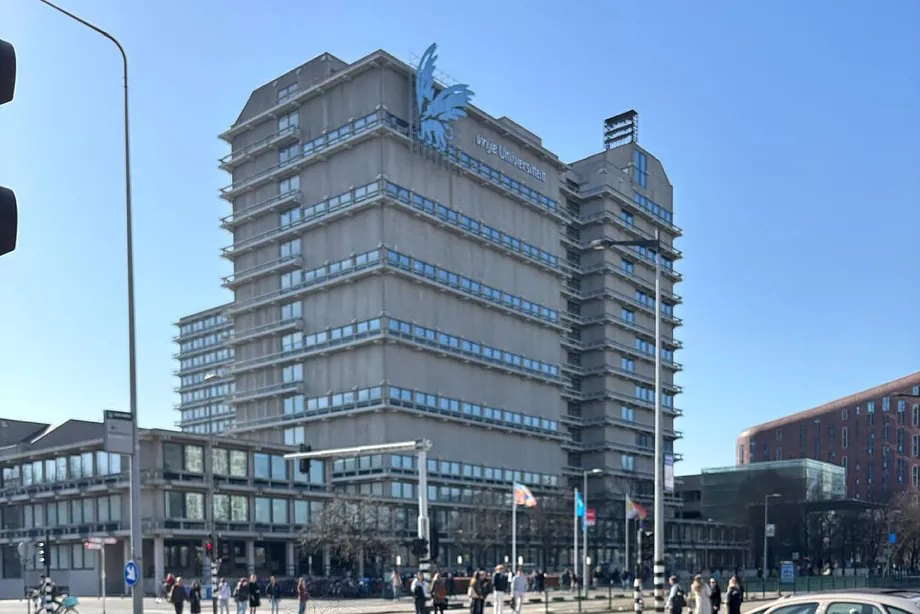The Madrilenian Lucía Braña and the Mallorcan Adrián Rodríguez, 19 and 20-year-old students in the second year of the English-taught Psychology degree at the Vrije Universiteit (VU) in Amsterdam, are concerned because this program is going to be phased out. They have received a letter from the faculty warning them that, due to the decision of the Netherlands Government to reduce university degrees taught in English, their studies will be discontinued in 2027 and only offered in Dutch.
"They allow us to finish the degree and obtain the title, but it is a highly valued program, and I am afraid it will lose its reputation. I don't know if it will cause me difficulties with the master's degree I want to pursue after completing a degree that will no longer exist by then," complains Lucía. "The program could lose value when canceled. It is a measure that even the Dutch themselves do not understand," laments Adrián.
European higher education is watching closely the changes being finalized by the new coalition government of the Netherlands, predominantly controlled by the far-right since 2024. Their proposed Balanced Internationalization Law, aiming for "greater control over the influx of international students and the use of foreign languages in education," is an indicator of the new geopolitical scenario. While in the USA visas are being revoked for university students and campuses in Catalonia are taking measures for Catalan to be the only language, the Netherlands is reversing its internationalization strategy. From being the mecca for attracting European foreign talent, it is now retracting. Why?
Sources from the Netherlands Ministry of Education respond that the "significant increase" in international students "is putting pressure on the quality, accessibility, and affordability of the system," while "the high number of programs in non-Dutch languages raises social and political concerns about preserving Dutch as the language of instruction." That's why they will prioritize the "promotion of Dutch" and will only offer programs in English "when socially desirable."
A report from the Dutch Agency for Internationalization in Education (Nuffic) adds that the influx of foreigners is behind the issues of "housing shortages and rising accommodation prices," and that "in the short term, they represent an expense for the national budget, as they pay the legally subsidized tuition fees, and these costs are borne by the Ministry of Education."
"The increase in international students has led to less funding per student," warns this organization, which estimates that there are 128,000 international students enrolled in programs on campuses funded by the government.
In a decade, the number of foreigners has tripled to represent 15% of the university population. Spaniards, with just over 6,000 students, are the fifth most numerous nationality after Germans (21,300), Italians (8,200), Romanians (7,400), and Chinese (6,200).
Adrián Rodríguez, a 20-year-old student from Mallorca.E. M.
This internationalization boom in Dutch universities began with Brexit when the United Kingdom ceased to be the favorite destination for young Europeans due to the increase in tuition fees. Last year, Adrián and Lucía paid 1,000 euros for the first year of their degree - the same as in public universities in Spain - and this second year, they have paid 2,000. In return, they study at the 37th best university in the world in their discipline. "The model is more focused on research and not as theoretical as in Spain. It is one of the most challenging degrees; to pass, you need to score a 6.5 out of 10, but it is also one of the most valued, and there are very good opportunities for graduates," explains Lucía.
Their university will remove the English-taught degrees in Biomedical Sciences and Religious Studies, in addition to Psychology, which will also disappear from three other campuses (Erasmus, Leiden, and UvA). The association of the 14 Dutch universities estimates that next year there will be 2,000 fewer new enrollment spots compared to the 19,000 in 2022/2023, when the peak was recorded. Instead, programs in universities in border regions, where there is no housing shortage, will be maintained.
The Psychology degree is paradigmatic because few EU countries offer it in English, and it has very good job placement. The Netherlands had become an international reference in this discipline but was also struggling to retain English-speaking graduates in the country.
Their situation is opposite to that of Spain, a leader in Erasmus but one of the countries with fewer international students with regular enrollment - 87,700, only 4% in public universities and 14% in private ones. In recent years, Spanish campuses have been making significant efforts to improve internationalization, but they face the obstacle that degrees last one year longer than in most countries, and the new Selectivity for non-EU students that the Government wants to implement from 2026 doesn't help either.
Spanish universities believe that the gap left by the Netherlands could be an opportunity for Spain. Non-EU students pay seven times more for tuition than Spaniards and contribute 6 billion euros each year: for every euro they spend on studies, they contribute 1.28 more to leisure, food, and accommodation. As with everything, there are two sides to the coin, as rental prices around Spanish universities have also skyrocketed.
"I understand that the Dutch want to protect their culture and language, but if the Netherlands has become a global university reference, it has been largely thanks to its internationalization," says Adrián. And he adds, "Those who blame us for the lack of housing are the same ones buying houses in Mallorca."
